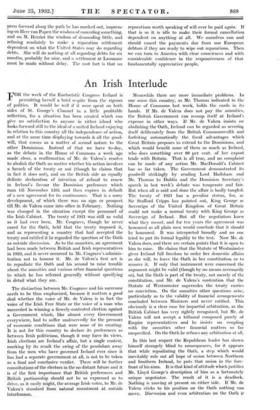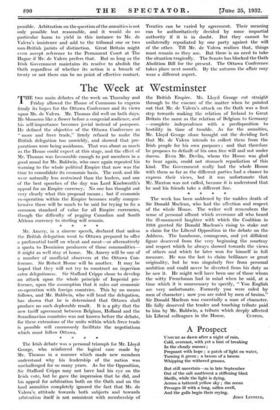An Irish Interlude
}OR the week of the Eucharistic Congress Ireland is permitting herself a brief respite from the rigours of politics. It would be well if it were spent on both sides of St. George's Channel in a little profitable reflection, for a situation has been created which can give no satisfaction to anyone in either island who looks forward still to the ideal of a united Ireland enjoying in relation to this country all the independence of action, and at the same time displaying towards it all the good- will, that comes as a matter of second nature to the other Dominions. Instead of that we have to-day, as the debate in the House of Commons a week ago made clear, a reaffirmation of Mr. de Valera's resolve to abolish the Oath no matter whether his action involves a breach of the treaty or not (though he claims that in fact it does not), and on the British side an equally definite declaration of intention of refusal to renew in Ireland's favour the Dominion preference which runs till November 15th and then expires in default of a new agreement for its continuance. That is a sorry development, of which there was no sign or prospect till Mr. de Valera came into office in February. Nothing was changed in the situation except the personnel of the Irish Cabinet. The treaty of 1921 was still as valid as it had ever been. Mr. Cosgrave, though he never cared for the Oath, held that the treaty imposed it, and as representing a country that had accepted the treaty and ratified it he regarded the question of the Oath as outside discussion. As to the annuities, an agreement had been made between British and Irish representatives in 1923, and it never occurred to Mr. Cosgrave's adminis- tration not to honour it. Mr. de Valera's first act is to repudiate the Oath and his second to raise trouble about the annuities and various other financial questions to which he has referred generally without specifying in detail what they are.
The distinction between Mr. Cosgrave and his successor needs to be thus emphasized, because it matters a good deal whether the voice of Mr. de Valera is in fact the voice of the Irish Free State or the voice of a man who succeeded in winning a fiercely-contested election against a Government which, like almost every Government everywhere, had to suffer undeservedly for the pressure of economic conditions that were none of its creating. It is not for this country to declare its preferences as between Irish politicians, though it may have its views. Irish elections are Ireland's affair, but a single contest, marking by its result the swing of the pendulum away from the men who have governed Ireland ever since it has had a separate government at all, is not to be taken as a final and conclusive verdict. There will be further consultations of the electors in the no distant future and it is of the first importance that British preferences and British partisanship should not be so expressed as to drive, as it easily might, the average Irish voter, to Mr. de Valera's standard from natural resentment at outside interference, .
Meanwhile there are more immediate problems. In one sense this country, as Mr. Thomas indicated in the House of Commons last week, holds the cards in its hands. If Mr. de Valera does not pay the annuities, the British Government can recoup itself at Ireland's expense in other ways. If Mr. de Valera insists on abolishing the Oath, Ireland can be regarded as severing itself deliberately from the British Commonwealth and forfeiting automatically the fiscal advantages which Great Britain proposes to extend to the Dominions, and which would benefit none of them so much as Ireland, who does something over 80 per cent, of her export trade with Britain. That is all true, and no complaint can be made of any action Mr. MacDonald's Cabinet has so far taken. The Government demonstrated its goodwill strikingly by sending Lord Hailsham and Mr. Thomas to Dublin and the Dominion Secretary's speech in last week's debate was temperate and fair. But when all is said and done the affair is badly tangled. The treaty of 1921 has a peculiar status, for, as Sir Stafford Cripps has pointed out, King George as Sovereign of the United Kingdom of Great Britain Could not make a normal treaty with King George as Sovereign of Ireland. But all the negotiators knew what they meant, and for ten years the agreement was honoured as all plain men would conclude that it should be honoured. It was interpreted broadly and no one tried to put its formal legality to the test. Now Mr. de Valera does, and there are certain points that it is open to him to raise. He claims that the Statute of Westminster gives Ireland full freedom to order her domestic affairs as she will, to leave the Oath in her constitution or to remove it. If only that instrument were concerned the argument might be valid (though by no means necessarily so), but the Oath is part of the treaty, not merely of the constitution, and Mr. de Valera's contention that the Statute of Westminster supersedes the treaty carries no conviction. On the annuities other questions arise, particularly as to the validity of financial arrangements concluded between Ministers and never ratified. This obviously is a clear case for impartial arbitration, as the British Cabinet has very rightly recognized, but Mr. de Valera will not accept a tribunal composed purely of Empire representatives and he insists on coupling with the annuities other financial matters so far unspecified. On the Oath he refuses any arbitration at all.
. In this last respect the Republican leader has shown himself strangely blind to consequences, for it appears that while repudiating the Oath, a step which would inevitably rule out all hope of union between Northern and Southern Ireland, he puts that union in the fore- front of his aims. It is that kind of attitude which justifies Mr. Lloyd George's description of him as a fortunately unique negotiator. The result of it is a deadlock. Nothing is moving at present on either side. If Mr. de Valera sticks to his position on the Oath nothing can move. Discussion and even arbitration on the Oath is possible. Arbitration on the question of the annuities is not only possible but reasonable, and it would. do no particular harm to yield in this instance to Mr. de Valera's insistence and add to the tribunal one or two non-British jurists of distinction. Great Britain might even accept reference to the Permanent Court at The Hague if Mr. de Valera prefers that. But so long as the Irish Government maintains its resolve to abolish the Oath regardless of whether its action is a breach of treaty or not there can be no point of effective contact. Treaties can be varied by agreement. Their meaning can be authoritatively decided by some impartial authority if it is in doubt. But they cannot be unilaterally repudiated by one party against the will of the other. Till Mr. de Valera realizes that, things must remain as they are. But there is no need to take the situation tragically. The Senate has blocked the Oath Abolition Bill for the present. The Ottawa Conference takes place next month. By the autumn the affair may wear a different aspect.



































 Previous page
Previous page